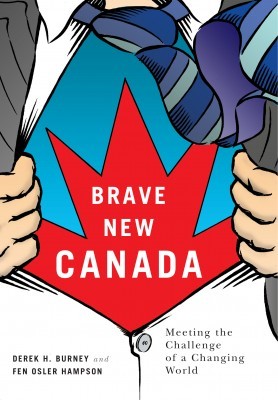Brave New Canada argues that our country’s foreign policy requires decisive change. The book’s authors, Derek H. Burney and Fen Osler Hampson, urge us to stop lamenting the bygone age of Pearsonian diplomacy. Instead of “looking at the world from a rear-view mirror,” we are advised to survey the fast-changing political landscape and seek pragmatic policies that advance Canadian interests.
Burney and Hampson assert that Canada remains too focused on trading with the slowing economies of the United States and Europe (the United States alone accounts for over 70% of our total trade). In recent years, the vast share of the globe’s economic growth has taken place in “emerging” markets, yet less than 8% of our exports go to these areas. China’s GDP will soon surpass that of the United States, but Canada still views itself largely in relation to its southern neighbour. Unlike the bold Australians, who have forged strong and successful links with the economies of the future, Canada has remained “comfortable and protected within a North American cocoon.”

Brave New Canada
Meeting the Challenge of a Changing World
Derek H. Burney and Fen Osler Hampson
McGill-Queen’s University Press
$29.95
cloth
244pp
9780773543980
This book’s central thesis is less provocative than the authors seem to think. Canadians with a passing interest in world affairs are doubtlessly aware that the rise of China and other rapidly developing countries will require major changes in our foreign and trade policies. Many of the book’s other claims are equally commonplace. For example, the authors argue that some global organizations such as the G20 may have outlived their usefulness, that education should be more closely aligned with employment needs, that Canadian companies are overly timid in seeking new markets and spend too little on research and development. Regardless of what one thinks of these opinions, no daily newspaper reader could possibly have avoided them.
Derek Burney was a chief of staff to former Progressive Conservative Prime Minister Brian Mulroney and served as Canada’s ambassador to the United States in the later Mulroney years; the book’s other author, Fen Hampson, holds the position of Chancellor’s Professor at Carleton University and is director of the Global Security and Politics program at the Centre for International Governance Innovation.
Despite its warnings against nostalgia, Brave New Canada looks back with fondness at Mulroney’s foreign policy, which comes as no surprise given Burney’s background. The authors take occasional shots at such liberal targets as Pierre Elliott Trudeau, Barack Obama, and “zealous environmentalist supporters.” Burney and Hampson present no serious arguments against these targets and thus alienate readers not already predisposed toward their ideological leanings. This tendency to preach to the choir is common in political non-fiction, but it is no less irksome for being common. Why write books that are intended to persuade if potentially persuadable readers end up pointlessly repelled?
Brave New Canada does contain moments of genuine insight, the best of which are found in its sixth chapter. This chapter includes brief but constructive suggestions on promoting democracy in places where the franchise is in danger of being used for sectarian purposes (for instance, the suppression of minority rights). Among other useful suggestions, the authors recommend focusing on such prerequisites for healthy democracy as constitutional restraints and judicial reform. If the rest of this book had been as thoughtful as this chapter, it would have been well worth reading. mRb






Sorry but the change is already happening and the authors (themselves of the Cold War generation) are failing to recognize it. G7 is on the way out while G20 is the new buzzword. The UN will become more (not less) important as the world turn from bi-polar (pun intended) to uni-polar to multi-polar (current reality). In short, NATO for defence, G20 for economics and UN for everything else could well be Canada’s new motto on foreign policy!